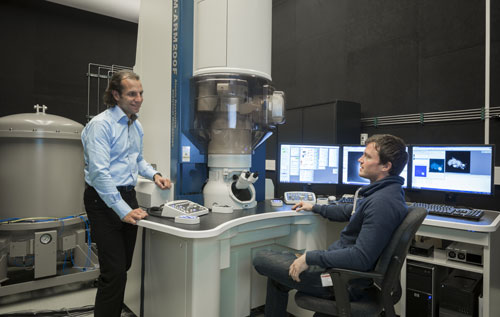| Nov 18, 2013 |
New lab for top research into solar cells
|
|
(Nanowerk News) A new test facility from Eindhoven University of Technology (TU/e) for breakthrough research into thin-film solar cells will be opened on Wednesday 27 November 2013. The new lab is part of the Solliance alliance, and includes a high-resolution transmission electron microscope that will allow atom-by-atom study of the components of solar cells.
|
|
Thin-film solar cells consist of stacked layers of different materials. The efficiency of these cells is to a large extent determined by the properties of the boundaries between the different layers. To gain a better understanding of these properties, the researchers want to study the materials and the boundaries between them atom-by-atom.
|
|
Seeing individual atoms
|
|
The new transmission electron microscope (TEM), supplied by JEOL, has such a high resolution that it allows individual atoms to be distinguished. This TEM also has an extra technology called EDS (Energy-Dispersive X-ray Spectroscopy). The extra-large EDS detector on this specific system enables determination at the atomic scale of the elements being viewed.
|
|
The new electron microscope has another big advantage over older systems – because it can operate at lower acceleration voltages, the microscope can also be used to study more delicate materials. This can be useful in studying solar cells, for example, consisting of organic molecules, polymers and graphene.
|
|
Public–private partnership
|
|
The new test facility is physically housed at Philips Innovation Services on the Eindhoven High Tech Campus, because Philips possesses the necessary knowledge and experience to operate the TEM. Researchers from TU/e and Solliance will be able to benefit from this expertise, while experts from Philips will be able to use the TEM for their own services. This will allow optimum use to be made of the available knowledge, expertise and facilities in what has now developed into the leading solar region of the Netherlands.
|
|
Solliance
|
|
The new TEM, costing around two million euros, has been financed by the Province of Noord-Brabant as part of Solliance. Solliance is an alliance that brings together the R&D activities in thin-film solar cells of TU/e, TNO, Holst Centre, ECN, Imec and Forschungszentrum Jülich. The location of the new TEM on the High Tech Campus is next to the Solliance building which is currently under construction. The activities in this new building will include pilot production lines for thin-film solar cells.
|
|
Transmission electron microscopy
|
|
A transmission electron microscope makes images using high-energy electrons instead of visible light. The electron beam passes through a thin specimen, and a set of electromagnetic lenses are used to create an enlarged image. Because electrons have a much shorter wavelength than (visible) light, a TEM allows much smaller structures to be imaged, with sizes of less than 0.1 nanometers.
|
 |
| Transmission electron microscope
|
|
Eindhoven University of Technology
|
|
Eindhoven University of Technology (TU/e) is a research-driven, design-oriented university of technology with a strong international focus. TU/e has defined strategic areas focusing on the societal challenges in the fields of Energy, Health and Smart Mobility. More than 300 researchers from 27 research groups work in the Strategic Area Energy on new, clean energy sources and the improvement of polluting energy sources. Examples of recent developments at TU/e are tailor-made biofuels for cleaner combustion, and thin-film solar cells that convert sunlight efficiently into electrical energy.
|
|
Solliance
|
|
Solliance is an alliance of R&D organizations working on the development of photovoltaic (PV) solar cells in the ELAT region (Eindhoven-Leuven-Aachen). The partners in Solliance are ECN, Imec, TNO, Holst Centre, TU/e and Forschungszentrum Jülich. Solliance’s ambition is to strengthen the position of the region as a world player in thin-film PV technology. Solliance creates synergy among more than 250 researchers with this common goal. Solliance aims to realize this ambition by joint use of state-of-the-art infrastructure, alignment of research programs and close cooperation with the solar business community. Solliance is supported by the Dutch Province of Noord-Brabant.
|
|
JEOL
|
|
JEOL Ltd. has more than 60 years’ experience in the development and production of analytical equipment. The company’s current product range includes scanning and transmission electron microscopes, electron probe microanalyzers, ion-beam systems, auger and photoelectron spectrometers, mass and NMR spectrometers and semiconductor equipment for scientific and industrial applications.
|
|
With its extremely advanced equipment and technologies JEOL offers tailor-made solutions worldwide for the analysis of both organic and inorganic materials. In this way JEOL makes a significant contribution to further breakthroughs in areas including developments in nanotechnology.
|
|
Philips
|
|
Philips Innovation Services helps high tech companies and knowledge institutes accelerate their innovation by offering advanced innovation services, expertise and high-tech facilities across the whole innovation process. From concept creation, product development, prototyping and small series production, industrialization, quality and reliability, to sustainability and industrial consulting, customers can choose from a comprehensive range of services to meet their innovation needs. Drawing on our extensive competences, these services engage the required knowhow to tackle our customer’s innovation challenge. Serving small/medium enterprises (SMEs), global corporations and research institutes across many different industries, we help our customers realize their full innovation potential.
|

